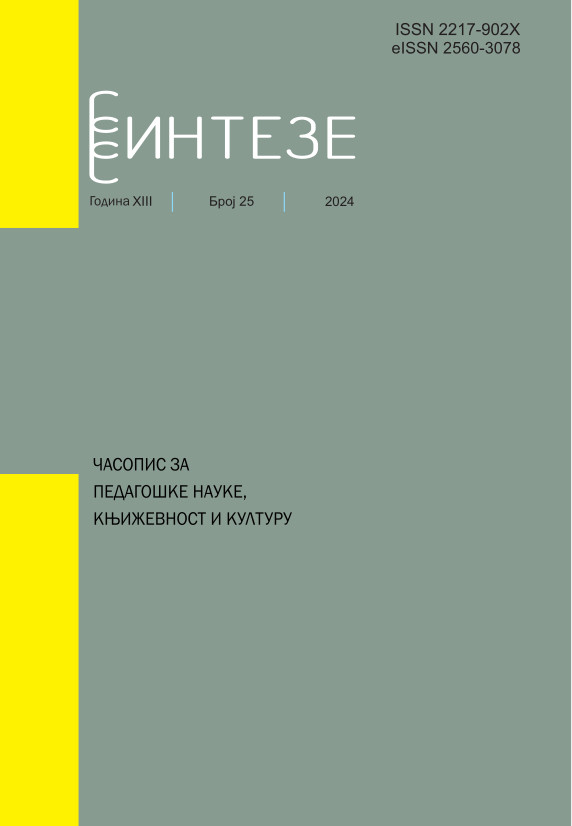Morality and Religion
Abstract
It is often argued, especially in polemics, that morality makes no sense if it is not grounded in faith. However, the question is whether religious beliefs and customs shape moral behavior? Is religion necessary for morality? The intersection of morals and religion involves the relationship between religious views and morals. It is common for religions to have value frameworks that aim to guide adherents in determining between right and wrong. The aim of this theoretical research is the presentation, ie the analysis of morals and religion. The need to choose the mentioned subject of research is imposed by its importance, insufficient research and the necessity of re-examination in the modern epoch of the crisis of the value system. Defining the similarities and differences between morals and religion, as well as their interpretation, is fundamental for understanding their relationship. Many scientific studies have failed to break down "morality" and "religion" into theoretically grounded elements. It is believed that the categories of "morality" and "religion" must be separated, in order to get a complete picture of complex interaction as a roadmap for future research into the relationship between morality and religion. Essentially, traditional moral values are based on spiritual values. That is why it is necessary to accept the universality of both the moral and the religious in every person, not only historically but also in the context of modernity and anticipated human future.
References
Akvinski, T. (1973). O biću i suštini. Beogradski izdavačko-grafički zavod.
Aslan, R. (2017). God: A Human History. Random House.
Barrett, J. L. (2007). Cognitive Science of Religion: What Is It and Why Is It? Religion Compass, 1(6), 768–786. https://doi.org/10.1111/j.1749-8171.2007.00042.x
Barrett, J. L., & Lanman, J. A. (2008). The science of religious beliefs. Religion, 38(2), 109–124. https://doi.org/10.1016/j.religion.2008.01.007
Bloom, P. (2012). Religion, Morality, Evolution. Annual Review of Psychology, 63(1), 179–199. https://doi.org/10.1146/annurev-psych-120710-100334
Cvetićanin, N. (2017). Religija i politika na istom izvorištu; arhetipski državnici i propovednici staroga doba kao spoj religije i (političke) veštine državništva. In M. Blagojević (Ed.), Religija u savremenom društvu (pp. 33–44). Institut društvenih nauka. http://iriss.idn.org.rs/134/1/NCveticanin_Religija_u_savremenom_drustvu.pdf
Djurić, D. (2015). Večnost sveta u antici i ranom srednjem veku. Srpsko filozofsko društvo.
Dourley, J. P. (2004). Jung, mysticism and the double quaternity: Jung and the psychic origin of religious and mystical experience. Harvest: International Journal for Jungian Studies, 50(1), 47–74.
Healy, N. M. (2021). Thomas Aquinas: Theologian of the Christian Life (1st ed.). Routledge. https://doi.org/10.4324/9781315264806
Holloway, R. (2017). A little History of religion. Yale University Press.
Kant, I. (2016). Zasnivanje metafizike morala. Dereta.
Kant, I. (2019). Kritika praktičkog uma. Dosije studio.
Kenterberijski, A. (1991). Proslogion. Moderna.
Mandzaridis, G. (2011). Hrišćanska etika. Kalenić.
Marek, Z., & Walulik, A. (2021). What Morality and Religion have in Common with Health? Pedagogy of Religion in the Formation of Moral Competence. Journal of Religion and Health, 60(5), 3130–3142. https://doi.org/10.1007/s10943-021-01279-6
McKay, R., & Whitehouse, H. (2015). Religion and morality. Psychological Bulletin, 141(2), 447–473. https://doi.org/10.1037/a0038455
Nenadović, M. M. (2007). Medicinska etika (Vol. 2). Medicinski fakultet.
Niče, F. (1980). S one strane dobra i zla: Uvod u jednu filozofiju budućnosti. Grafos.
Niče, F. (1991). Volja za moć. Dereta.
Norenzayan, A. (2014). Does religion make people moral? Behaviour, 151(2–3), 365–384. https://doi.org/10.1163/1568539X-00003139
Podskalski, G. (2010). Teologija i filosofija u Vizantiji: Spor oko teološke metodike u duhovnoj istoriji pozne Vizantije (XIV/XV), njegove sistematske osnove i istorijski razvoj. Pravoslavni bogoslovski fakultet.
Radovanović, S. Ž. (2022). Hajdeger-Formiranje moderne estetike i umetnost kao pojava kulture. Sinteze - Časopis Za Pedagoške Nauke, Književnost i Kulturu, 22, 1–10. https://doi.org/10.5937/sinteze11-41959
Saroglou, V. (2011). Believing, Bonding, Behaving, and Belonging: The Big Four Religious Dimensions and Cultural Variation. Journal of Cross-Cultural Psychology, 42(8), 1320–1340. https://doi.org/10.1177/0022022111412267
Schaer, H. (1951). Religion and the cure of souls in Jung’s psychology. Routledge.
Sharpe, M. (2014). Stoic virtue ethics. In The Handbook of Virtue Ethics (pp. 28–41). Routledge.
Valdez, J. (2014). Stoic Philosophy: Its Origins and Influence. Journal of Social Philosophy Research, 2(4), 56–68. https://doi.org/10.12966/jspr.11.01.2014
Copyright (c) 2024 Milos V. Arsic

This work is licensed under a Creative Commons Attribution 4.0 International License.
Autori koji objavljuju u ovom časopisu pristaju na sledeće uslove:
- Autori zadržavaju autorska prava i pružaju časopisu pravo prvog objavljivanja rada i licenciraju ga "Creative Commons Attribution licencom" koja omogućava drugima da dele rad, uz uslov navođenja autorstva i izvornog objavljivanja u ovom časopisu.
- Autori mogu izraditi zasebne, ugovorne aranžmane za neekskluzivnu distribuciju članka objavljenog u časopisu (npr. postavljanje u institucionalni repozitorijum ili objavljivanje u knjizi), uz navođenje da je članak izvorno objavljen u ovom časopisu.
- Autorima je dozvoljeno i podstiču se da postave objavljeni članak onlajn (npr. u institucionalni repozitorijum ili na svoju internet stranicu) pre ili tokom postupka prijave rukopisa, s obzirom da takav postupak može voditi produktivnoj razmeni ideja i ranijoj i većoj citiranosti objavljenog članka (Vidi Efekti otvorenog pristupa).

